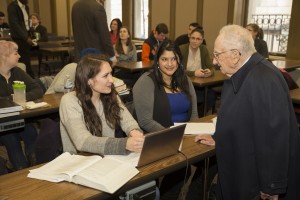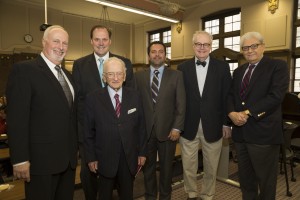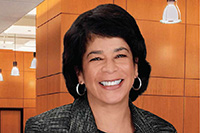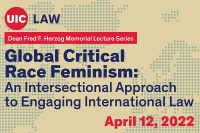
Guest presenter Ben B. Ferencz chats with students before his presentation as the Dean Fred F. Herzog Memorial Lecture speaker. Ferencz served as the chief prosecutor for the U.S. Army in the Einsatzgruppen Trial, one of the 12 military trials held at Nuremberg, Germany, after World War II.
Preventing aggressive war and creating peace among turmoil is possible. But it can’t be done without a properly enforced international justice system, according to the last surviving Nuremberg prosecutor Benjamin B. Ferencz.
“I am sure that it is possible. I have seen the impossible happening, and so have some of you,” Ferencz told students and guests at the April 14, 2014, Dean Fred F. Herzog Memorial Lecture on human rights. “The emancipation of women, the end of colonialism, same-sex marriages, a black president – all of these things would have been impossible if you would have asked anybody 25 years ago, ‘Can it happen?’”
Ferencz discussed his experience as a U.S. prosecutor in post-World War II Germany and expressed his hopes for future generations to promote “law not war.” Ferencz was just 27 on his first case as a lawyer when as part of the Nuremberg Trials. He prosecuted 22 defendants accused of murdering more than a million people during the war.
“War is hell,” Ferencz said. “Nuremberg taught me that creating a world of tolerance and compassion would be a long and arduous task. I also learned that if we did not devote ourselves to developing effective world law, the same cruel mentality that made the Holocaust possible might one day destroy the entire human race.”

Welcoming Ben Ferencz (second from left) to The John Marshall Law School are (from left) Professors Gerald Berendt, Mark Wojcik, Shahram Dana, Dean John E. Corkery and DePaul University Professor Emeritus Cherif Bassiouni (LL.M. ’66).
Ferencz served in WWII under General George S. Patton. As Nazi atrocities were uncovered, he was transferred to the U.S. Army’s War Crimes Branch to gather evidence of Nazi brutality and apprehend criminals.
Ferencz is a staunch proponent of the International Criminal Court, saying: “We continue to go on with wars because the present system is very simple. If the two heads of state are unable to agree, they take a group of nice people and they send them off to kill another group of nice people. They don’t know these people and they are doing it for reasons they don’t understand. That’s the current system. It’s not common sense. If you have a disagreement with your neighbor, you don’t buy a gun. You take them to court because that’s the humane and rational thing to do.”
Ferencz said that for thousands of years, the use of armed force has been hailed as the way to glory, power and heroism. Changing that practice and mindsets of the leaders behind it would be challenging, but not insurmountable, he said.
“Don’t tell me anything possible is not possible. It’s possible. You have to put in the effort for it and never give up. Never give up, that’s my slogan,” Ferencz said.
“This is a law school. Imagine what the world would look like if instead of going to war, killing all these innocent people who had nothing to do with anything, you could find the rule of law instead and you could hold them in contempt instead of the glorification of war,” he added. “How the world would change if you just shifted around and said ‘law, not war.’”
To view Ferencz’s full speech visit https://bit.ly/1p4aeOO


